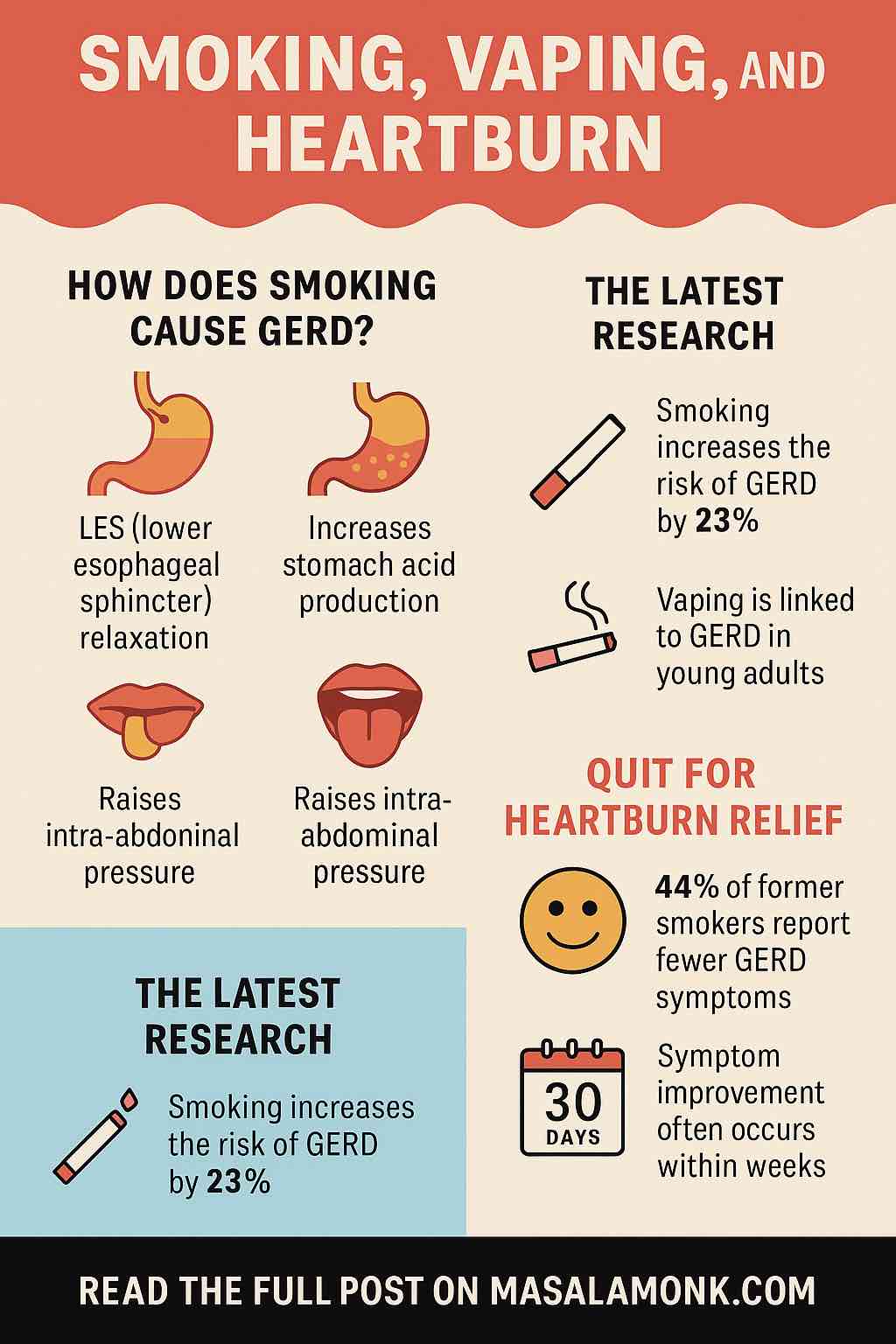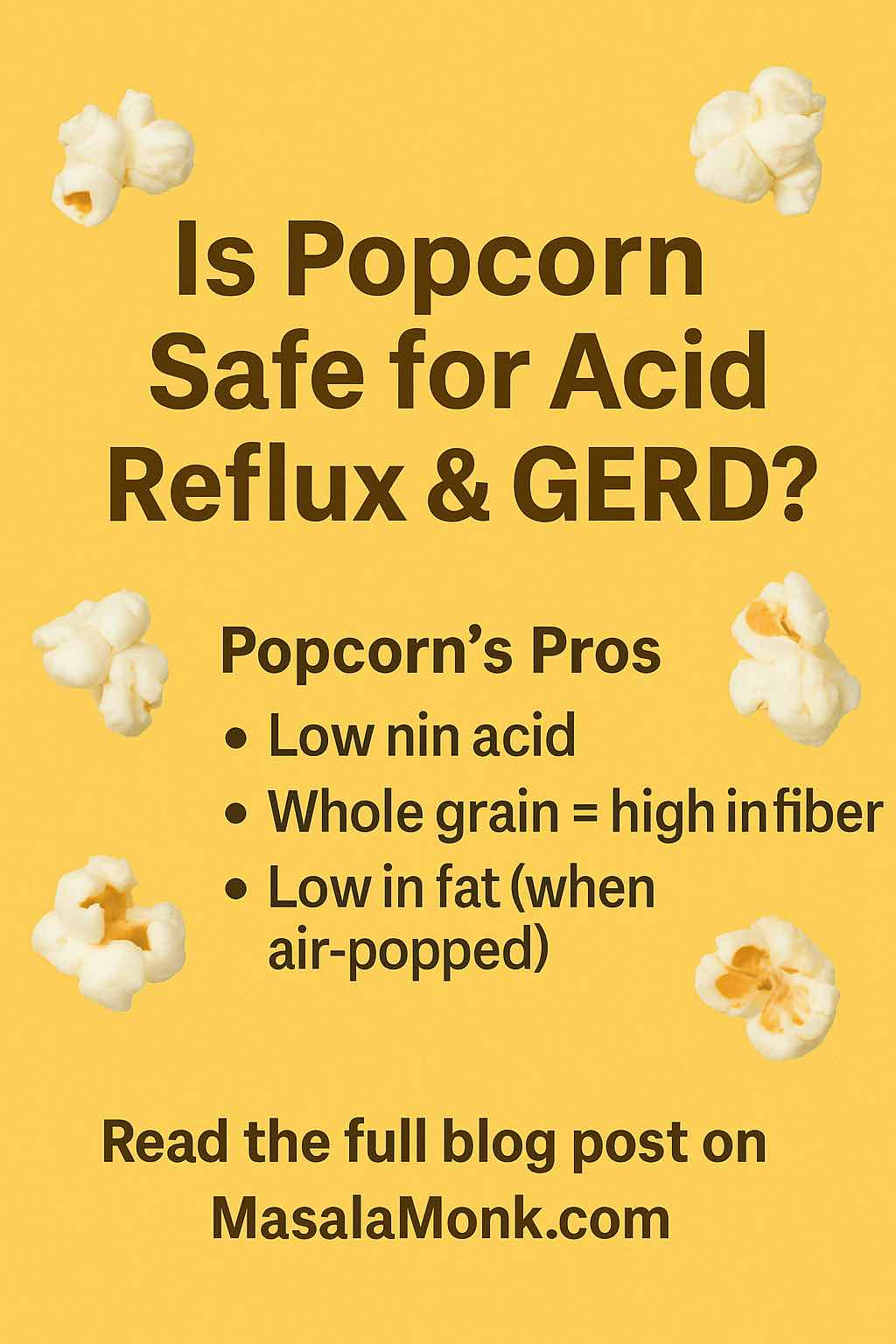
If you’ve ever felt that fiery burn creeping up your chest after a cigarette—or wondered if your e-cigarette habit could be behind your stubborn heartburn—you’re not alone. Acid reflux, or gastroesophageal reflux disease (GERD), affects up to 20% of adults worldwide. And while spicy food and stress get all the blame, the truth is: smoking and vaping are among the most overlooked triggers.
Recent studies (2024–2025) have shed new light on just how closely smoking (yes, including e-cigarettes!) is linked with GERD and what really happens inside your body when you light up. Here’s what you need to know—and what you can do to take back control.
Smoking and GERD: How Cigarettes (and Vapes) Trigger Heartburn
The Science in Simple Terms
Let’s break it down. When you eat or drink, a tight ring of muscle called the lower esophageal sphincter (LES) opens to let food into your stomach, then squeezes shut to keep acid where it belongs. When the LES is weak or relaxed at the wrong time, stomach acid can splash up into your esophagus, causing that telltale burn.
Here’s where smoking comes in:
- Nicotine, the main active ingredient in cigarettes and vapes, causes the LES to relax—even when it shouldn’t.
- Smoking increases stomach acid production, making more acid available to reflux.
- It dries up your saliva, which normally helps neutralize acid and clear it out of your esophagus.
- Chronic smoking causes coughing, and coughing spikes pressure in your abdomen, pushing acid upward.
A 2024 study of over 9,000 adults found current smokers were 23% more likely to have GERD than non-smokers. Even those who switched to e-cigarettes were not spared: a Russian study using 24-hour acid monitoring showed vapers had 2.5 times more reflux episodes per day than non-users.
Why Vaping Isn’t a “Safe” Alternative
E-cigarettes and vaping devices are often seen as safer than traditional cigarettes. Unfortunately, the latest evidence tells a different story. Vaping still delivers nicotine, which is the real troublemaker for your LES. In fact, university research in 2025 showed that young adults who vape experience just as much (or more) heartburn as traditional smokers.
Bottom line:
Switching to vaping doesn’t protect your stomach or your esophagus. It might actually make things worse for some people.
Passive Smoke: The Hidden Risk for Non-Smokers
Think you’re in the clear if you don’t smoke or vape? Not quite. Recent public health reviews reveal that secondhand smoke can weaken the LES in children and adults, increasing the risk of heartburn—even if you never light up yourself.
Real Stories: Heartburn Relief After Quitting
Here’s the good news. You can reverse much of the damage! Multiple studies confirm that quitting smoking or vaping leads to significant improvement in GERD symptoms—sometimes within weeks, often within a year. In one follow-up, nearly 44% of former smokers reported less heartburn after quitting, compared to zero improvement among those who kept smoking.
One Japanese study found that those who quit—especially those with a healthy weight—felt dramatically better, even if some esophageal irritation persisted.
What You Can Do (Right Now)
1. Quit Smoking and Vaping—For Good
- You don’t have to go it alone. There are more support options than ever: nicotine replacement, prescription meds, counseling, apps, and community groups.
- Set a quit date, tell someone you trust, and use tools that work for you. The relief for your throat, chest, and overall health will be worth it.
2. Steer Clear of Secondhand Smoke
- If you live or work with smokers, ask them to step outside, ventilate indoor spaces, or consider quitting together.
3. Eat and Live GERD-Smart
- Don’t lie down after meals (wait at least 2–3 hours).
- Raise the head of your bed to prevent nighttime reflux.
- Maintain a healthy weight—excess belly fat puts pressure on your stomach.
- Limit known triggers: spicy foods, caffeine, alcohol, chocolate, and high-fat meals.
4. Talk to Your Doctor
- GERD is manageable, and early intervention makes a huge difference. If you have persistent heartburn (2+ times per week), seek medical advice—especially if you smoke.
Key Takeaways
- Smoking and vaping are powerful triggers for heartburn and GERD—not just because of smoke, but because of nicotine’s effect on your body.
- Quitting works! Many people find real relief, often within months.
- Vaping isn’t safe for reflux. Secondhand smoke is a hidden risk.
- Combine lifestyle changes, medical management, and support for the best outcomes.
Final Thoughts: Your Next Step
Heartburn isn’t just uncomfortable—it’s a warning sign. GERD can lead to serious complications over time if ignored. But the solution could be as simple as putting out that last cigarette—or switching off your vape.
If you’re thinking about quitting, don’t wait for the “perfect” time. Start today, get support, and know that every day without nicotine is a win for your gut, your esophagus, and your future.
Ready to Take Action?
- Explore local quit programs, online support groups, or talk to your healthcare provider.
- Share this post with friends or family who need to hear it.
- Remember: Your gut (and the rest of you) will thank you.
References & Resources:
- Medical News Today: Smoking and GERD
- BMC Gastroenterology: Smoking and GERD risk
- Frontiers in Public Health: Smoking and GERD
- Kazan Medical Journal: Vaping and Acid Reflux
For more on GERD triggers and quitting resources, check your local health service or GERD advocacy organizations.
10 Most Common FAQs About Smoking, Vaping, and Heartburn (GERD)
1. Can smoking really cause heartburn or GERD?
Answer:
Yes. Multiple studies confirm that smoking increases your risk of heartburn and GERD. Nicotine weakens the lower esophageal sphincter (LES), allowing stomach acid to flow back into the esophagus and cause symptoms.
2. Is vaping safer for acid reflux than smoking cigarettes?
Answer:
No. Vaping still delivers nicotine, which relaxes the LES and triggers reflux just like smoking. Recent studies show vapers can have as many or more reflux episodes as smokers.
3. If I only smoke occasionally, am I still at risk for GERD?
Answer:
Yes. Even occasional smoking can weaken the LES and increase your risk of heartburn, especially if you’re prone to reflux or have other risk factors.
4. Will quitting smoking or vaping stop my heartburn?
Answer:
For many people, yes. About 44% of former smokers experience less heartburn after quitting. Symptom relief can occur within weeks to months, though some damage may persist if GERD has been present for a long time.
5. Does secondhand smoke increase GERD risk?
Answer:
Yes. Secondhand smoke can also weaken the LES and increase heartburn risk, especially in children and sensitive individuals.
6. How quickly will I notice improvements in my reflux after quitting?
Answer:
Some people notice improvement in just a few weeks, but most see significant relief within 3–12 months of quitting smoking or vaping.
7. What are some other lifestyle changes that help reduce heartburn?
Answer:
Avoid lying down after meals, raise the head of your bed, maintain a healthy weight, and avoid trigger foods (like spicy, fatty, or acidic foods). Combine these with quitting smoking/vaping for best results.
8. Are nicotine patches or gum safe if I have GERD?
Answer:
Nicotine in any form can potentially trigger reflux, but patches may be less likely than smoking or vaping to cause heartburn since they avoid direct exposure of the esophagus to smoke or vapor. Discuss with your doctor for personalized advice.
9. Can medications for heartburn work if I keep smoking?
Answer:
Medications like PPIs and H2 blockers can help, but their effectiveness is reduced if you continue smoking or vaping. Quitting will boost the benefits of these treatments.
10. Should I see a doctor about heartburn if I smoke or vape?
Answer:
Yes. Persistent heartburn (more than twice a week) should be evaluated by a healthcare professional—especially if you smoke or vape. Early treatment and lifestyle changes can prevent complications.










